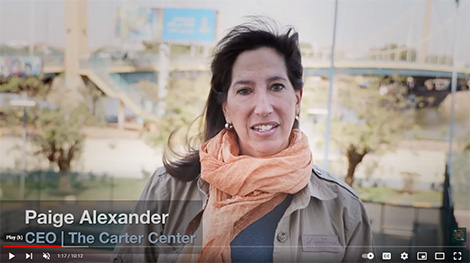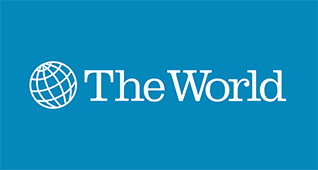Some links below may require a login to read the full article.
 Two horrifying diseases are close to eradication: polio and Guinea worm disease.
Learn more »
Two horrifying diseases are close to eradication: polio and Guinea worm disease.
Learn more »
Washington Post
Only 13 human cases were reported last year, down from millions in the 1980s. The terrible disease is caused by drinking contaminated water. Former president Jimmy Carter hoped to outlive the Guinea worm, and he just might. Learn more »
The Atlanta Journal-Constitution
 One of his [last] wishes, he said, was to see the Guinea worm disease finally be eradicated.
Learn more »
One of his [last] wishes, he said, was to see the Guinea worm disease finally be eradicated.
Learn more »
Published by GPB.
 As GPB looks back on the work of the 39th president and Georgia native, one of his most impactful accomplishments is the eradication campaign to combat Dracunculiasis, best known as Guinea worm disease. Here is a visual timeline and oral history of Carter's progress.
Learn more »
As GPB looks back on the work of the 39th president and Georgia native, one of his most impactful accomplishments is the eradication campaign to combat Dracunculiasis, best known as Guinea worm disease. Here is a visual timeline and oral history of Carter's progress.
Learn more »
This historical review was produced by National Active and Retired Federal Employees (NARFE)’s CDC Chapter 1419 in collaboration with many CDC retirees and The Carter Center and the Task Force for Global Health. Manuscript development was led by Elvin Hilyer and Chapter 1419 President Elaine Gunter. Learn more »
Published by Le Progrès.
Le Progrès is a daily paper published in French in N'Djamena, Chad. The Minister of Health Dr. Abdoulmadjd Abderahim hosted Carter Center CEO Paige Alexander and the US Ambassador to Chad Alex Laskaris to observe first-hand how Chad is successfully eradicating Guinea worm disease. The team was joined by Governor of Chari Baguirmi Province, Secretary General of Ministry of Health, administrative and health authorities, as well as local religious and traditional leaders. Learn more »
Published by News Ghana.
 The Economic Community of West African States (ECOWAS) has been recognized for gains made by the West Africa region in tackling neglected tropical diseases (NTDs) that affect more than 600 million people in Africa, nearly half of whom are in ECOWAS.
Learn more »
The Economic Community of West African States (ECOWAS) has been recognized for gains made by the West Africa region in tackling neglected tropical diseases (NTDs) that affect more than 600 million people in Africa, nearly half of whom are in ECOWAS.
Learn more »
Harvard Public Health
Kenyans remember President Jimmy Carter as the man who defeated the Guinea worm. The disease is on schedule to be eradicated by 2030. Barack Obama’s Kenyan roots make him the American president we Kenyans are most proud of, but the one we are most thankful for is Jimmy Carter. Learn more »
In accordance with the recommendations of the International Commission for the Certification of Dracunculiasis Eradication (ICCDE), WHO has certified 200 countries, areas and territories (including 188 WHO Member States) as free of transmission of dracunculiasis (Guinea-worm disease). Learn more »

Los Angeles Times
 Just a few hours before President Carter underwent his first radiation treatment for brain cancer, he spoke of his hope, in the time he had left, to purge the world of a parasitic worm disease.
Learn more »
Just a few hours before President Carter underwent his first radiation treatment for brain cancer, he spoke of his hope, in the time he had left, to purge the world of a parasitic worm disease.
Learn more »
While it could be said that some of the greatest accomplishments of a U.S. president are not why they’re most remembered, for these two presidents, advancing global health is a defining achievement of their leadership. Forbes Contributor Anand Parekh is the chief medical advisor at the Bipartisan Policy Center. Learn more »
Published by The Jackson Laboratory.
 Public health expert Donald R. Hopkins, M.D., M.P.H., reflects on his gift to the JAX Endowment for Diversity Initiatives. Long before decades of service to The Carter Center, leadership roles at the Centers for Disease Control and Prevention, tenure as an assistant professor at Harvard and board certifications in pediatrics and public health, Hopkins made the pivotal choice to accept a spot at Morehouse College, the country’s only all-male historically black college or university.
Learn more »
Public health expert Donald R. Hopkins, M.D., M.P.H., reflects on his gift to the JAX Endowment for Diversity Initiatives. Long before decades of service to The Carter Center, leadership roles at the Centers for Disease Control and Prevention, tenure as an assistant professor at Harvard and board certifications in pediatrics and public health, Hopkins made the pivotal choice to accept a spot at Morehouse College, the country’s only all-male historically black college or university.
Learn more »
 At the center of the global campaign to eradicate guinea worm disease is the Carter Center Joining me from Mali is Adam Joseph Weiss, director of the Guinea Worm Eradication Program at the Carter Center who explains why Guinea Worm Disease may be the second disease (after smallpox) to ever become eradicated thanks to human effort.
Learn more »
At the center of the global campaign to eradicate guinea worm disease is the Carter Center Joining me from Mali is Adam Joseph Weiss, director of the Guinea Worm Eradication Program at the Carter Center who explains why Guinea Worm Disease may be the second disease (after smallpox) to ever become eradicated thanks to human effort.
Learn more »
Published by Health Policy Watch.
 According to a report last week by The Carter Center, great progress toward eliminating guinea worm has been made, with the number of human cases annually falling from 3.5 million in the mid-1980s to just 13 cases in 2022, poising it to become the second disease in human history that could be eradicated altogether.
Learn more »
According to a report last week by The Carter Center, great progress toward eliminating guinea worm has been made, with the number of human cases annually falling from 3.5 million in the mid-1980s to just 13 cases in 2022, poising it to become the second disease in human history that could be eradicated altogether.
Learn more »
Published by Voice of America.
 “We had six human cases in Chad, five human cases in South Sudan, and one in Ethiopia and one in the Central African Republic on the border with Chad,” Adam Weiss, director of the Carter Center’s Guinea Worm Eradication Program, told VOA during a recent Skype interview.
Learn more »
“We had six human cases in Chad, five human cases in South Sudan, and one in Ethiopia and one in the Central African Republic on the border with Chad,” Adam Weiss, director of the Carter Center’s Guinea Worm Eradication Program, told VOA during a recent Skype interview.
Learn more »
 Jan. 30, 2023, marked the fourth annual World NTD Day, highlighting the global community’s commitment to ending neglected tropical diseases (NTDs) that cause immeasurable suffering among the world’s most marginalized communities. Together The Carter Center and our partners celebrated hard-earned progress to #EndtheNeglect and #BeatNTDs.
Learn more »
Jan. 30, 2023, marked the fourth annual World NTD Day, highlighting the global community’s commitment to ending neglected tropical diseases (NTDs) that cause immeasurable suffering among the world’s most marginalized communities. Together The Carter Center and our partners celebrated hard-earned progress to #EndtheNeglect and #BeatNTDs.
Learn more »
Published by Voice of America.
 According to the Carter Center, there were only 13 human cases of Guinea worm disease last year, pushing the illness closer to eradication. The Atlanta-based center was co-founded by former U.S. President Jimmy Carter and his wife, Rosalynn Carter.
Learn more »
According to the Carter Center, there were only 13 human cases of Guinea worm disease last year, pushing the illness closer to eradication. The Atlanta-based center was co-founded by former U.S. President Jimmy Carter and his wife, Rosalynn Carter.
Learn more »
Published by Voice of America.
 The Carter Center said recently that only 13 human cases of Guinea worm disease were reported worldwide last year. That is a major drop from 3.5 million cases of infected people in 1986. Audio package: https://learningenglish.voanews.com/a/6935557.html
Learn more »
The Carter Center said recently that only 13 human cases of Guinea worm disease were reported worldwide last year. That is a major drop from 3.5 million cases of infected people in 1986. Audio package: https://learningenglish.voanews.com/a/6935557.html
Learn more »
 When doctors first started trying to eradicate Guinea worm disease nearly four decades ago, more than 3.5 million people were infected. Last year, that number dropped to 13. Now The Carter Center, which has spearheaded the fight against the disease, says it's in the final — and, perhaps most difficult — stage of completely eradicating it in humans.
Learn more »
When doctors first started trying to eradicate Guinea worm disease nearly four decades ago, more than 3.5 million people were infected. Last year, that number dropped to 13. Now The Carter Center, which has spearheaded the fight against the disease, says it's in the final — and, perhaps most difficult — stage of completely eradicating it in humans.
Learn more »
 Adam Weiss, director of the Carter Center's Guinea Worm Eradication Program, saw his first case of Guinea worm disease as a Peace Corps volunteer in 2003. “I had never heard of Guinea worm before arriving in Ghana,” he said.
Learn more »
Adam Weiss, director of the Carter Center's Guinea Worm Eradication Program, saw his first case of Guinea worm disease as a Peace Corps volunteer in 2003. “I had never heard of Guinea worm before arriving in Ghana,” he said.
Learn more »
 When doctors first started trying to eradicate Guinea worm disease nearly four decades ago, more than 3.5 million people were infected. Last year, that number dropped to 13. Donald R. Hopkins, a special advisor for Guinea worm eradication at the Carter Center, tells As It Happens host Nil Köksal how they did it.
Learn more »
When doctors first started trying to eradicate Guinea worm disease nearly four decades ago, more than 3.5 million people were infected. Last year, that number dropped to 13. Donald R. Hopkins, a special advisor for Guinea worm eradication at the Carter Center, tells As It Happens host Nil Köksal how they did it.
Learn more »
 Only 13 human cases of Guinea worm disease were reported worldwide last year, according to the Carter Center in the United States. After decades of progress, Adam Weiss, director of The Carter Center’s Guinea Worm Eradication Program, cautioned the end phase of the global effort to eradicate the parasitic disease will be "the most difficult."
Learn more »
Only 13 human cases of Guinea worm disease were reported worldwide last year, according to the Carter Center in the United States. After decades of progress, Adam Weiss, director of The Carter Center’s Guinea Worm Eradication Program, cautioned the end phase of the global effort to eradicate the parasitic disease will be "the most difficult."
Learn more »
 When the Carter Center assumed leadership of the global Guinea Worm Eradication Program in 1986, about 3.5 million people in Africa and Asia were afflicted with the debilitating illness caused by the parasite.
Learn more »
When the Carter Center assumed leadership of the global Guinea Worm Eradication Program in 1986, about 3.5 million people in Africa and Asia were afflicted with the debilitating illness caused by the parasite.
Learn more »
 The number of cases of a painful and debilitating tropical illness fell last year to a record low, fuelling hopes that it will soon become the second human disease in history to be eradicated. Only 13 cases of guinea worm disease were reported worldwide in 2022, a provisional figure that if confirmed would be the smallest ever documented, the US-based Carter Center has said.
Learn more »
The number of cases of a painful and debilitating tropical illness fell last year to a record low, fuelling hopes that it will soon become the second human disease in history to be eradicated. Only 13 cases of guinea worm disease were reported worldwide in 2022, a provisional figure that if confirmed would be the smallest ever documented, the US-based Carter Center has said.
Learn more »
 The World's host Marco Werman speaks with Adam Weiss, director of the Carter Center's Guinea Worm Eradication Program. The Carter Center says Guinea worm disease is close to be eradicated. Only 13 human cases were reported worldwide last year.
Learn more »
The World's host Marco Werman speaks with Adam Weiss, director of the Carter Center's Guinea Worm Eradication Program. The Carter Center says Guinea worm disease is close to be eradicated. Only 13 human cases were reported worldwide last year.
Learn more »
 “We are truly in the midst of that last mile and experiencing firsthand that it is going to be a very long and arduous last mile,” Adam Weiss, director of The Carter Center’s Guinea Worm Eradication Program, told The Associated Press. “Not so much as it taking more than the next seven years – five to seven years – but just knowing that it’s going to be a slow roll to get to zero.”
Learn more »
“We are truly in the midst of that last mile and experiencing firsthand that it is going to be a very long and arduous last mile,” Adam Weiss, director of The Carter Center’s Guinea Worm Eradication Program, told The Associated Press. “Not so much as it taking more than the next seven years – five to seven years – but just knowing that it’s going to be a slow roll to get to zero.”
Learn more »
 The Carter Center said Tuesday that only 13 human cases of Guinea worm disease were reported worldwide last year.After decades of progress, the eradication program’s director cautioned the end phase of the global effort to eradicate the parasitic disease will be “the most difficult.”
Learn more »
The Carter Center said Tuesday that only 13 human cases of Guinea worm disease were reported worldwide last year.After decades of progress, the eradication program’s director cautioned the end phase of the global effort to eradicate the parasitic disease will be “the most difficult.”
Learn more »
Please sign up below for important news about the work of The Carter Center and special event invitations.